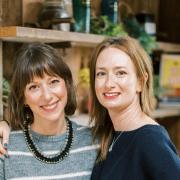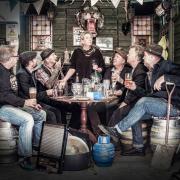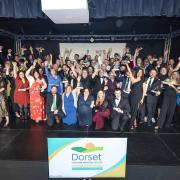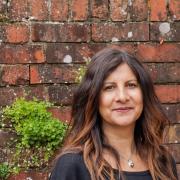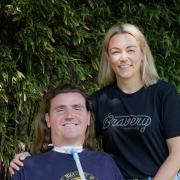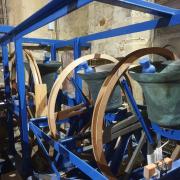Fanny Charles meets some of the residents and businesses owners who are proud to call Dorset’s newest town the place where they work, live and play
A new town on green fields west of Dorchester – a dream project for a Prince with radical views on architecture, or a blot on the landscape? Twenty five years ago, Poundbury was a vision – and a controversy.
A quarter of a century later, Poundbury is an established urban extension to Dorchester, with a picturesque “village” square, a grand piazza, homes of all shapes and sizes (more than one-third of which are social housing). Last year 185 local businesses created 2,345 jobs. These include dozens of individually owned shops, and a thriving social scene.
The people who live and work there love it. Everyone talks about the sense of community they have found since moving there – and “moving” is a key element in the success of this project.
“We are all ex-pats,” says retired GP Peter Tate, who moved with his wife Judy from Corfe Castle to Poundbury last year. “Everyone here has come from somewhere else.”
“We love it. We have made so many friends,” says Kathie Curtis, who came with her husband Tony from Gloucester nearly seven years ago. “People have moved into Poundbury from far away. There is no cliqueyness – it is such a wonderful mix of people.” Tony adds that easy access to local amenities is particularly good. “We’ve got everything we want right here – doctor, dentist, chemist, the bus, shops and restaurants.”
Emma Teasdale, a former philosophy and ethics teacher who runs Bonjour cafe in Babeny Walk, grew up in Gillingham, a Dorset town that has absorbed huge developments, including a major GLC resettlement.
A self-taught cook and baker, who learned from her mother, Emma bought Bonjour two years ago, and lives in Poundbury with her dachshund, Dougie. She attended a talk by Leon Krier about the founding principles of Poundbury, and is enthusiastic about its vision, particularly that one job should be created for every home. “It makes so much sense,” she says. “The number of independent businesses gives Poundbury its unique character.”
Emma is an active member of the Poundbury business group and is on the committee of the new Poundbury WI. With about 100 other local women she went to the inaugural meeting, and put herself forward for the committee, to give a voice for younger women. “We are all moving towards a common goal – Poundbury is an example of what a community can be.”
Judy Tate, a talented pastel painter, has also joined the WI. She and her husband Peter are members of the portrait group which meets weekly in The Quiet Space. The Tates have a house in the newest phase, built like all the Poundbury homes with the highest levels of thermal insulation (to minimise energy consumption and noise). They overlook a building site but, thanks to the insulation, they are not disturbed by the work. In fact, according to the couple their 17th century cottage in Corfe Castle was noisier.
They first looked at Poundbury 15 years ago, and liked the concept, but there wasn’t enough for them at the time. Now, they have everything they want, much of it within walking distance. Peter, who is the author of the successful Doctor’s Communication Handbook (about to go into its eighth edition), is particularly pleased about the new school - Damers First School. “As a community, Poundbury has got everything,” he says.
Tony and Kathie Curtis have a bird’s-eye view of Queen Mother Square, and have watched its development with keen interest. They are enthusiastic supporters of the Dorset Food and Arts Festival, first held in the square in 2012 to celebrate the Queen’s Diamond Jubilee and the Olympics.
“We saw the square being built and we’ve loved every minute of it,” says Tony, a retired engineer, who recalls meeting Prince Charles a few years ago. “He said he was terribly sorry about the noise and I said, ‘We’ve enjoyed it.’
“I think the Prince’s vision for Poundbury is brilliant."
A brace of business
Poundbury’s independent shops include the award-winning Brace of Butchers on the edge of Queen Mother Square. Owned by Tom Amery, who is also managing director of the Watercress Company near Moreton, it draws foodies from across the district.
It’s not just the skill and expertise of the “brace” – Rob Owen and Ben Black – and the quality of the locally sourced meat, but the wide range of fresh fruit and vegetables, Jurassic Coast shellfish and other local products.
Young businesswoman Katie Burrows-Kerr opened her hair-dressing salon Meraki (a Greek word meaning soul, creativity, love) last year on Pummery Square, choosing reclaimed wood for her fittings to reflect the village feel of this first phase of Poundbury.
She lives in Weymouth, and had been “searching for the right place” for her business for several years: “I really love Poundbury – the feel of it, the architecture, the community.” Katie’s clients come from as far afield as Lymington and Bournemouth.
The success of both The Brace of Butchers and Meraki reflects another aspect of Poundbury now – people are travelling from outside the area to visit its wonderful array of independent shops, businesses and services.
Poundbury is Bloomin’ Amazing
The Poundbury commitment to sustainability benefits the whole West Dorset district, thanks to the pioneering Anaerobic Digester (AD) at Rainbarrow Farm. In the winter, it produces enough gas for the whole of Poundbury and part of west Dorchester (4,500 homes). In the summer, when demand decreases, it heats more than 60,000 homes from Lyme Regis to Bovington.
And this year, the green energy project has a new product – Bloomin’ Amazing, an organic soil conditioner, weed suppressant and plant fertiliser, made from the digestate, the maize and vegetable by-product of the AD process.
Rainbarrow Farm, just south west of Poundbury, was the UK’s first commercial biogas-to-grid plant, turning tonnes of food waste and maize from surrounding farms into renewable energy, more than meeting the 20 per cent target of the original planning permission. In 2013 the project was a winner in the British Renewable Energy Leadership Awards.
“We wanted to do something that benefitted the wider community,” says Poundbury project manager Peter James. When he arrived 15 years ago, the farmhouse and farm buildings, now the Duchy headquarters and Poundbury Garden Centre, were dilapidated. Peter fell through the floor in the farmhouse!
The AD plant is run by JV Energen, a joint venture between the Duchy Of Cornwall and JV Farming, which is headed up by Duchy Of Cornwall tenant farmer Nick Finding. The biogas goes straight into the national grid, while the digestate is sold locally to organic farmers and will soon be available, under the Bloomin’ Amazing name, through garden centres, beginning with the Gardens Group in Poundbury.
The open days at Rainbarrow Farm are very popular and Peter hopes that local people will be similarly keen to buy the new organic soil conditioner.
“Dorset people like things that are local,” he says. “It’s a virtuous circle – using local waste and maize to generate gas, and the by-product, the digestate, is an organic soil improver.”
A Social Hub & Royal Local
It is the same story, on a much grander scale, at the Duchess of Cornwall, the flagship inn of Dorset’s historic Hall & Woodhouse brewery.
With its popular restaurant and a buzzing bar – as well as tables outside when the weather permits – the handsome building on the corner of Queen Mother Square has become a social hub for Poundbury residents, as well as drawing customers from the region and beyond.
Managing director Anthony Woodhouse says the opening of Queen Mother Square lifted Poundbury from a place to live and work to one that is attracting visitors and tourists, and the Duchess is at its heart: “It’s a focal point for the community, whether they’re meeting for work, drinks, lunch or evening meals. We get people staying to visit friends or family, for business and for holidays.”
Annabel Elliot, sister of the Duchess of Cornwall and a Dorset-based interior designer, advised on the design of the 20 bedrooms. The main stairs were inspired by Hogwarts!
Building a Vision
The Poundbury project began in the late 1980s, when West Dorset District Council selected land owned by the Duchy of Cornwall to expand Dorchester, the smallest county town in the country.
As Duke of Cornwall, the Prince of Wales was keen to work with the council to create a model urban extension of Dorset’s county town. He appointed architect and urban planner Leon Krier to design a sustainable, autonomous community. Krier used the principles described in the Prince’s book, A Vision of Britain, to provide integrated employment and housing, give priority to people not cars, with vernacular architecture using traditional materials.
Construction on the first phase began in October 1993 and the final, fourth, phase should be completed by 2025.
As Secretary and Keeper of the Records of the Duchy of Cornwall, Sir Jimmy James, now in his 80s, was closely involved when the Poundbury project began and has watched the progress with keen interest.
“It was the Prince who really drove it,” he recalls. “He was hands-on in terms of the principle and the details.”
Sir Jimmy is particularly proud of the way that social housing is integrated with freehold properties – “and you can’t tell the difference,” he says.
More…
• 10 Dorset towns you really must visit - From cool coastal resorts to bustling market hubs, Andy Greeves chooses ten towns whose history, ambience and busy events diary make them ‘must visit’ destinations






